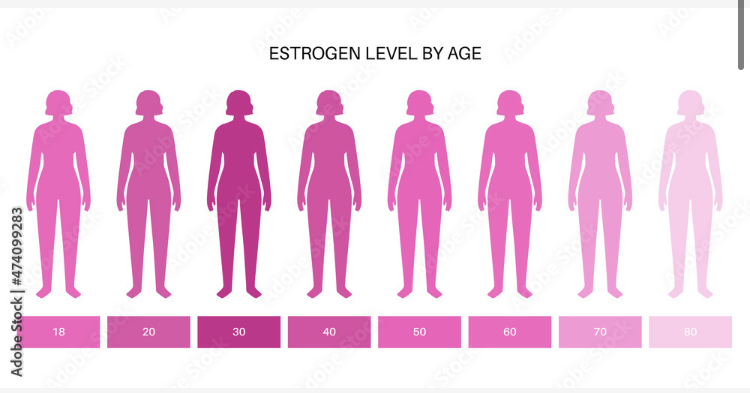
Estrogen is a hormone that plays a fundamental role in the development, regulation, and maintenance of various physiological processes in the human body. While commonly associated with female reproductive health, estrogen also influences numerous other systems and functions. In this comprehensive guide, we delve into the intricate world of estrogen, exploring its functions, benefits, health implications, and much more.
What is Estrogen?
Estrogen belongs to a group of hormones known as steroid hormones, primarily produced in the ovaries in females and in smaller amounts in the testes in males. However, it’s important to note that estrogen is present in both sexes, albeit at different levels. The three primary types of estrogen are estrone (E1), estradiol (E2), and estriol (E3), each with its specific functions and roles in the body.
Functions of Estrogen:
Reproductive Health: Estrogen plays a central role in the development of secondary sexual characteristics in females, such as breast development, regulation of the menstrual cycle, and maintenance of the uterine lining necessary for pregnancy.
Bone Health: Estrogen helps maintain bone density by inhibiting bone resorption and promoting bone formation. It also plays a crucial role in bone growth and remodeling.
Cardiovascular Health: Estrogen has cardio-protective effects, including promoting healthy blood vessel function, improving cholesterol levels, and reducing the risk of atherosclerosis.
Brain Function: Estrogen influences various aspects of brain function, including cognition, mood regulation, and memory formation. It also plays a role in neuroprotection and synaptic plasticity.
Skin Health: Estrogen contributes to the maintenance of skin hydration, elasticity, and thickness. It also influences collagen production, which helps reduce the appearance of wrinkles and maintains skin integrity.
Health Implications of Estrogen Imbalance:
Menopause: During menopause, estrogen levels decline significantly, leading to various symptoms such as hot flashes, night sweats, vaginal dryness, and mood swings. Hormone replacement therapy (HRT) may be prescribed to alleviate these symptoms.
Osteoporosis: Estrogen deficiency can contribute to bone loss and increase the risk of osteoporosis, a condition characterized by weakened bones and an increased susceptibility to fractures.
Cardiovascular Disease: Estrogen deficiency is associated with an increased risk of cardiovascular disease, including coronary artery disease, stroke, and peripheral artery disease.
Cognitive Decline: Declining estrogen levels during menopause have been linked to cognitive decline and an increased risk of neurodegenerative diseases such as Alzheimer’s disease.
Reproductive Disorders: Imbalances in estrogen levels can lead to various reproductive disorders, including polycystic ovary syndrome (PCOS), endometriosis, and uterine fibroids.
Maintaining Estrogen Balance:
Healthy Lifestyle: Regular exercise, a balanced diet rich in fruits, vegetables, and whole grains, adequate sleep, and stress management can help maintain healthy estrogen levels.
Hormone Replacement Therapy (HRT): For women experiencing severe symptoms of menopause, HRT may be recommended to supplement declining estrogen levels and alleviate symptoms.
Phytoestrogens: Certain plant-based compounds, such as soy isoflavones and flaxseeds, contain phytoestrogens that can mimic the effects of estrogen in the body and may help alleviate menopausal symptoms.Avoidance of Endocrine Disruptors: Minimizing exposure to endocrine-disrupting chemicals found in certain plastics, pesticides, and personal care products can help prevent disruptions in estrogen balance.
Estrogen is a multifaceted hormone with far-reaching effects on various aspects of health and well-being. From reproductive health to bone density, cardiovascular function, and cognitive function, estrogen plays a pivotal role in maintaining overall health. Understanding the functions, benefits, and implications of estrogen imbalance is crucial for promoting optimal health and well-being throughout the lifespan. By adopting healthy lifestyle habits and seeking appropriate medical interventions when necessary, individuals can support estrogen balance and enhance their quality of life.
Estrogen and Menopause
During menopause, the ovaries gradually produce less estrogen, resulting in symptoms such as hot flashes, night sweats, vaginal dryness, mood swings, and changes in libido. These symptoms can vary in severity and duration, significantly impacting a woman’s quality of life.
Understanding the role of estrogen in menopause is crucial for effectively managing symptoms and promoting overall well-being. Hormone replacement therapy (HRT), which involves supplementing estrogen levels through medication, is a common treatment option for alleviating menopausal symptoms. HRT can help restore hormonal balance, reduce hot flashes, improve vaginal dryness, and prevent bone loss.
#menopause #menopausematter #menopausesupport #menopauseeducation #menopausehelp #perimenopause